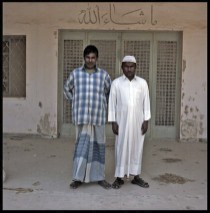Puget Sound researcher sponsored by the London School of Economics reveals the facts and urge government action
TACOMA, Wash. – University researchers will meet Qatari government officials on Tuesday, Dec. 9 (AST) to present recommendations on how to improve the justice system for Middle East migrant laborers who have legal claims against their employers.
The researchers, including Andrew Gardner of University of Puget Sound, will present a new study, sponsored by the London School of Economics’ Middle East Centre, that details migrant workers’ experiences in the Qatar justice system. The report recommends measures to make the system fairer, more responsive, and easier to access.
The report, Labour Migrants and Access to Justice in Contemporary Qatar, addresses non-payment of wages, withholding of passports, unsafe working conditions, and other humanitarian issues that many migrants encounter while working in the Middle East. In recent years these have attracted unflattering international press attention, as Qatar and nearby nations import millions of cheap, foreign laborers from India, Nepal, the Philippines, and elsewhere. Qatar’s role as host of soccer’s 2022 FIFA World Cup—and the massive construction underway for the event—have made the oil-rich state a particular lightning rod for critical press.
Andrew Gardner, from University of Puget Sound in Washington state, and Silvia Pessoa and Laura Harkness, both from Carnegie Mellon University Qatar, prepared the 60-page report.
Gardner will present the findings, in a closed session, to invited Qatari officials from the Ministry of Labor and Social Affairs and the Ministry of Justice, as well as researchers and representatives from foundations and universities.
The report contends that Qatar’s worldwide reputation and its regional leadership role will benefit from a justice system that establishes a new standard of efficiency and integrity in the Middle East.
“With its ambitious developmental plans for the coming decade, the number of labor migrants employed in Qatar is expected to grow by a million migrants or more,” the report says. “Qatar has the world’s attention. It also serves as a beacon of a new kind of modernity in the Indian Ocean world. In Qatar’s position of influence and leadership, the experiences of all foreigners on the peninsula need to remain at the forefront of Qatar’s attention.”
In Qatar—a peninsula in the Persian Gulf east of Saudi Arabia—foreign workers already outnumber citizens more than 9-to-1. The world’s wealthiest state per capita, Qatar is a place where modern apartment blocks, theaters, universities, and sports centers provide a high standard of living for local citizens, while, every night, thousands of migrant workers are trucked back to sparsely provided working camps, where they live six men to a room.
Among the justice system issues named in the report are:
- Complex and sometimes exploitative situations with employers, including non-payment of wages, passport confiscation, inadequate housing, physical abuse, and unethical labor brokers.
- The justice system for seeking redress for grievances or protection is extremely difficult for migrants to access and navigate.
- Migrants who do bring a legal case often are suspended from work, evicted from the employer’s housing, and have no right to seek other work. Unable to survive, they often drop their cases.
Specific recommendations made in the report to the State of Qatar, the Department of Labor Relations, the Labor Court, and the Ministry of the Interior include:
- Increase the speed of handling migrants’ cases, which currently often take a year or more
- Provide translation services for migrants, who speak more than 20 languages
- Allow migrants to seek other legal work while a case is in process
- Provide authorities with more punitive measures, including penalties for employers who withhold worker pay or refuse to attend court
- Give domestic workers the right to grievance mechanisms (which are currently denied to them)
- Create a monitoring program to track migrant worker cases and complaints, so as to pinpoint problems and solutions
Overall it is estimated that more than 11 million foreign workers are employed in the oil-rich states of the Arabian Peninsula, according to an earlier report by Gardner, Pessoa, and others. Andrew Gardner, associate professor of anthropology at University of Puget Sound, has been traveling to the area and researching migrant workers for more than 10 years. He believes the worker conditions in Qatar are representative of those in other Middle Eastern nations.
Gardner’s earlier work, done in conjunction with Carnegie Mellon University Qatar faculty and others, includes A Portrait of Low-Income Migrants in Contemporary Qatar; City of Strangers: Gulf Migration and the Indian Community in Bahrain, and numerous other papers and book chapters.
Press photos of the authors and of migrant workers in Qatar are available upon request.
Photos on page: Migrant workers in the Middle East, including a group on the bus going to work and an injured worker.
For the full report visit: http://www.lse.ac.uk/middleEastCentre/publications/Reports/LabourMigrantsQatarEnglish.pdf
Tweet this: New report, #Qatar migrants & justice. Andrew Gardner @univpugetsound, Silvia Pessoa @CarnegieMellonQ #MiddleEast http://bit.ly/1w6EudL
Follow us on Twitter! twitter.com/univpugetsound


